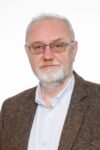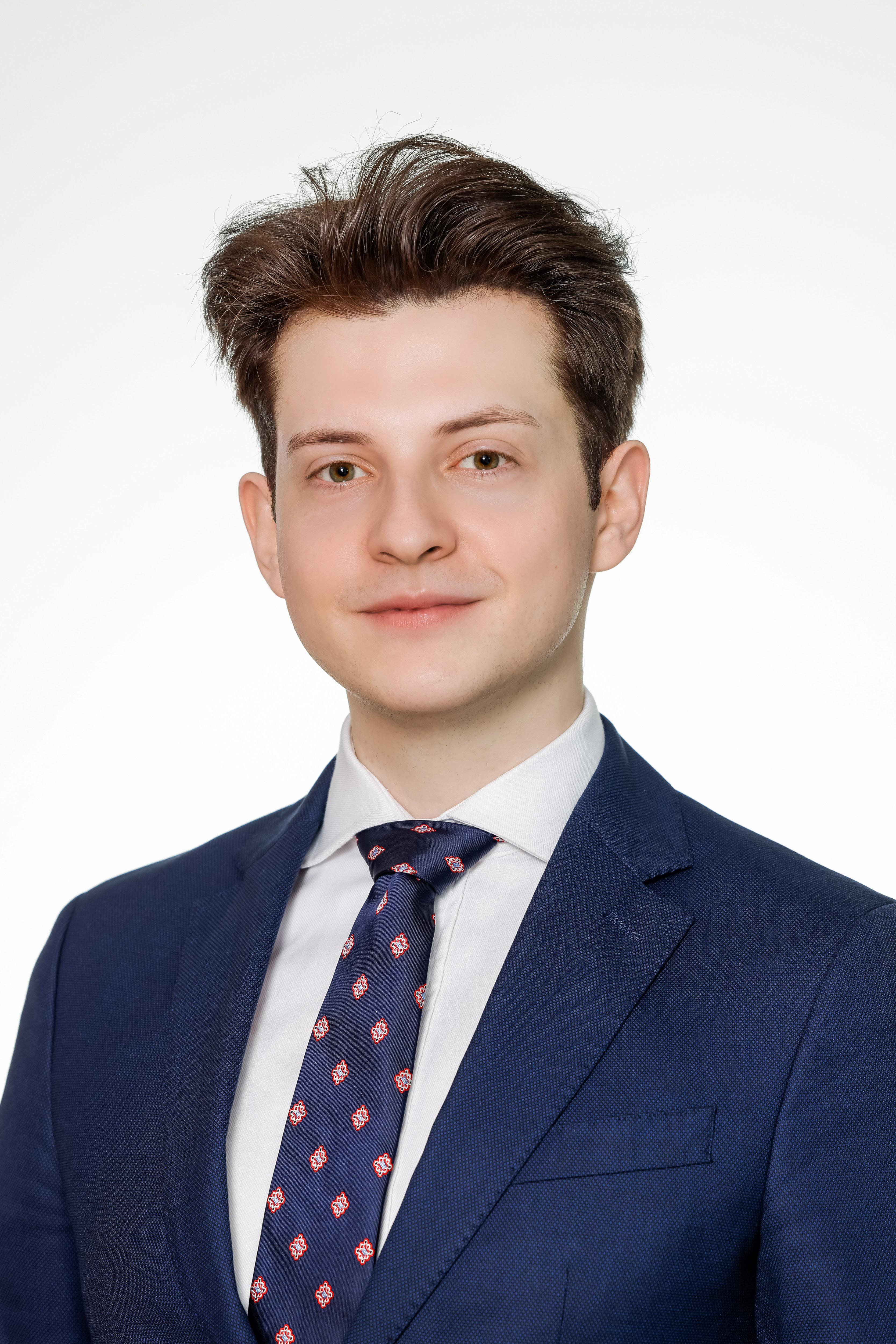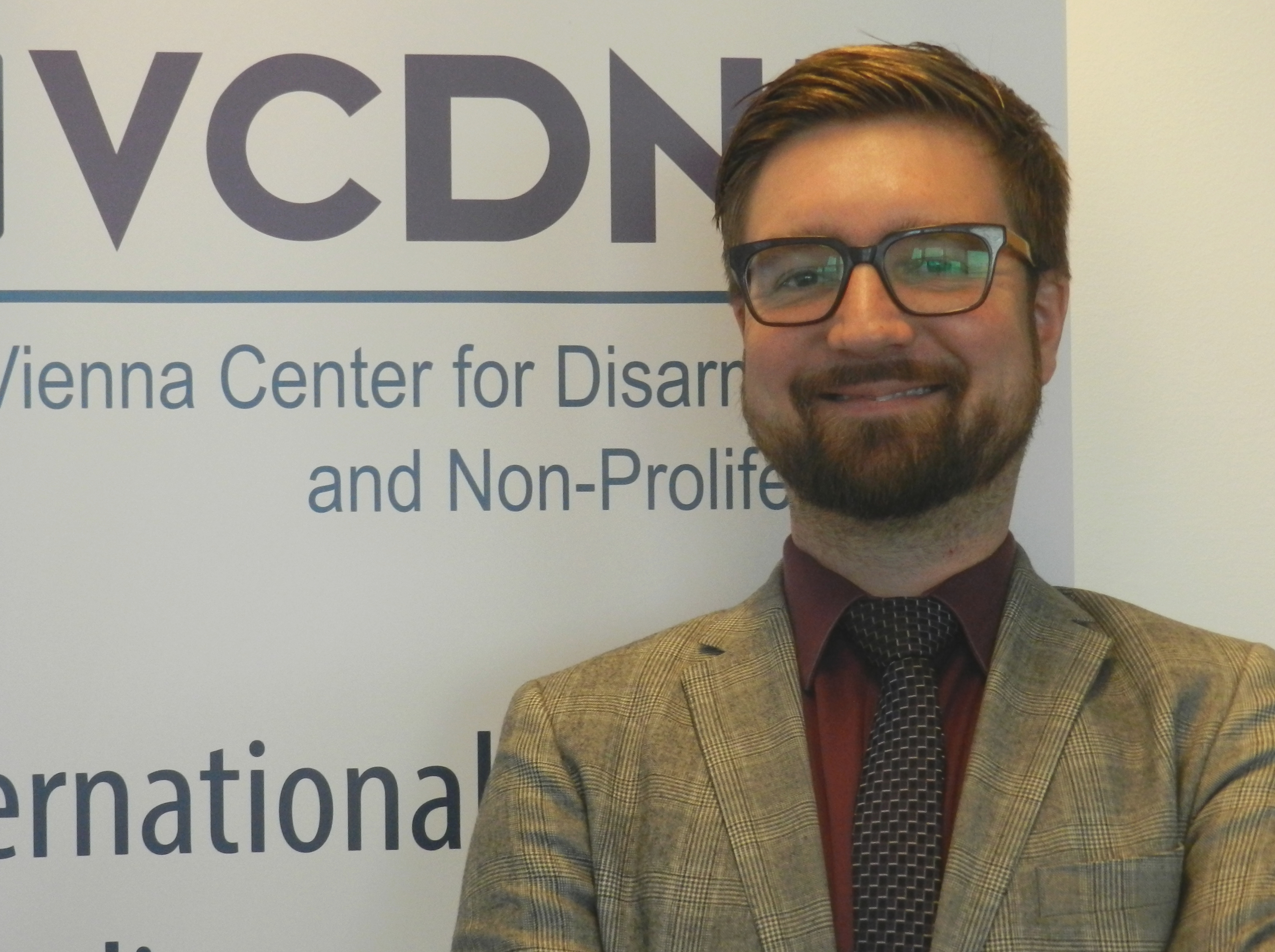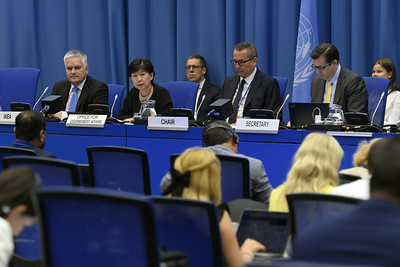
The 2023 Preparatory Committee to the 2026 Review Conference of the Treaty on the Non-Proliferation of Nuclear Weapons (NPT) met in Vienna, Austria from 31 July to 11 August 2023. Preceding the Preparatory Committee, NPT States Parties convened for a week-long working group meeting aimed at identifying recommendations for further strengthening the review process. VCDNP experts participated in both meetings, including as speakers and moderators in 10 events and members of two States Parties’ delegations. Director of the International Organisations in Non-Proliferation Programme Gaukhar Mukhatzhanova served as an advisor on the team of the Chair of the Working Group and Preparatory Committee, while Senior Research Associate Federica Dall’Arche served on the Italian delegation.
During the Preparatory Committee meeting, the VCDNP organised three of its own side events, which addressed feminist foreign policy and its effect on nuclear non-proliferation policy, the role of the International Atomic Energy Agency’s (IAEA) coordinated research projects (CRPs) in expanding the benefits to States of the use of ionising radiation, and the IAEA’s Seven Pillars on Nuclear Safety and Security in Conflict Zones.
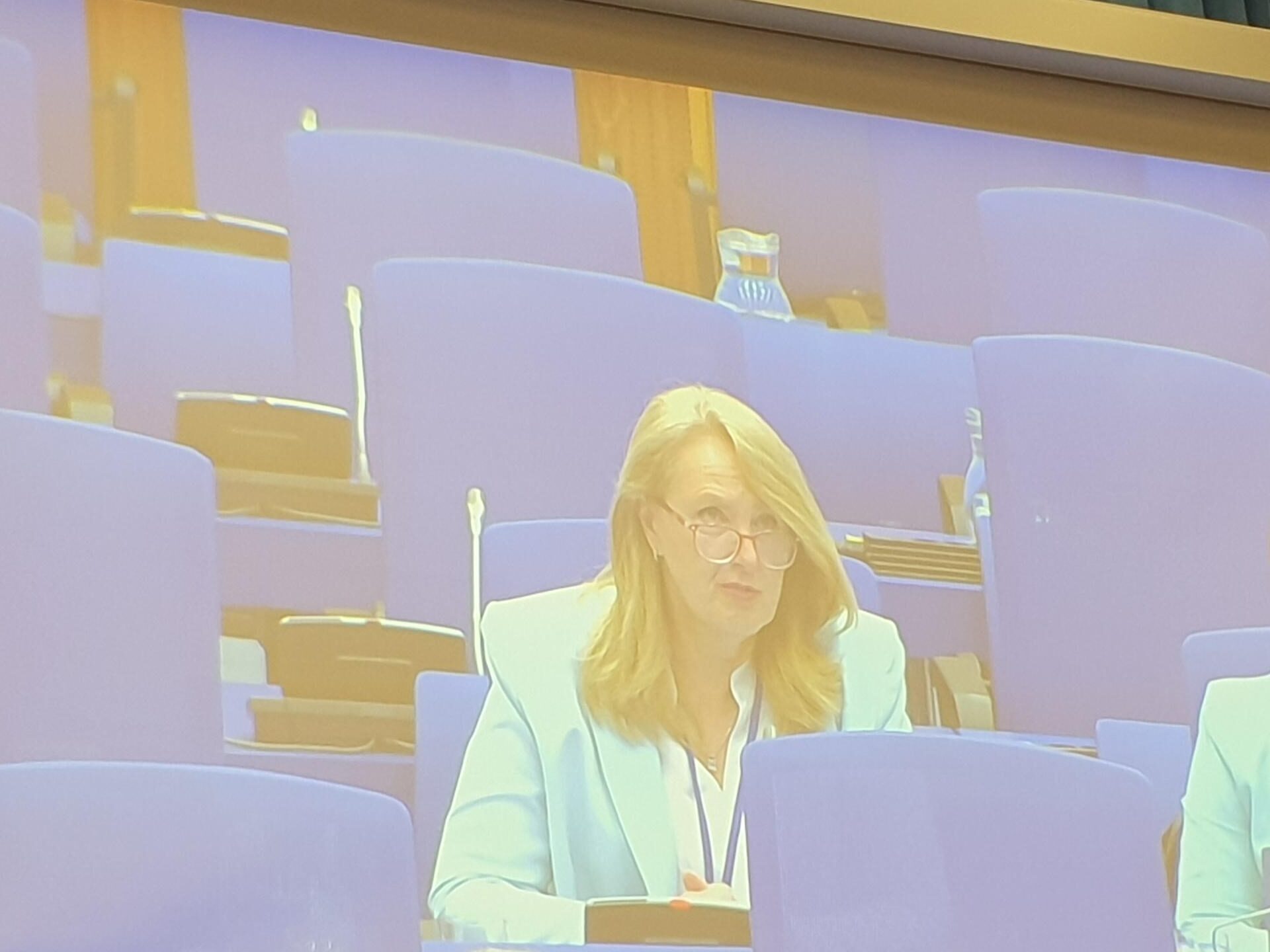
The 10th NPT Review Conference established a working group on further strengthening the review process of the Treaty. The working group met in Vienna the week before the Preparatory Committee in a closed format, but included one session dedicated to statements by non-governmental organisations. Executive Director Elena K. Sokova delivered a statement on behalf of the VCDNP and the James Martin Center for Nonproliferation Studies (CNS). Ms. Sokova presented the results of a recent VCDNP-CNS project that convened informal discussions with NPT States Parties and developed recommendations for potential improvements to the NPT review process. The associated report, “Further Strengthening the NPT Review Process: Reflections and Recommendations”, was authored by CNS Non-Resident Distinguished Expert Thomas Markram and VCDNP’s Director of the International Organisations and Non-Proliferation Programme Gaukhar Mukhatzhanova.
Ms. Sokova presented the recommendations in four broad areas: the role of the Preparatory Committees and their Chairs; early appointment of and coordination between Chairs; accountability and transparency; and inclusivity.
On 31 July, Gaukhar Mukhatzhanova spoke at a side event organised by the Government of Japan, focused on the International Group of Eminent Persons for a World without Nuclear Weapons (IGEP) and the group’s message to the first Preparatory Committee meeting.
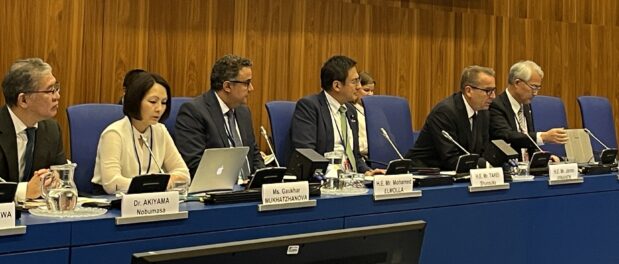
Ms. Mukhatzhanova commented on the message, particularly the points concerning the risk of use of nuclear weapons and strengthening the NPT review process. She noted how developments in the past several years, especially Russia’s invasion of Ukraine and associated discussions of possible nuclear weapon use, have stimulated a trend toward “re-normalisation” of nuclear weapons and risk undermining the nuclear taboo. In this context, she highlighted the IGEP message’s calls for actions to uphold the norm against the use of nuclear weapons but also noted the lack of reference to compliance with international humanitarian law. With regard to strengthening the review process, Ms. Mukhatzhanova commented that discussion of ways to improve transparency and accountability, particularly through regular reporting by the nuclear-weapon States, were central to the debates at the working group the previous week. She underscored that this subject will continue to be topical during the current review cycle.
On 1 August, Gaukhar Mukhatzhanova spoke at a side event on nuclear risk reduction, organized by the UN Institute for Disarmament Research (UNIDIR), with support from the Government of Switzerland. Ms. Mukhatzhanova reviewed the development of the nuclear risk reduction discourse in the context of the NPT review process, from the focus on de-alerting and operational readiness of nuclear weapons systems to the discussion of crisis management and prevention of escalation. She noted the importance of the Humanitarian Initiative on Nuclear Weapons in drawing attention to both the probability of nuclear weapons use and its catastrophic consequences, thus adding urgency to the nuclear risk reduction debate before the most recent deterioration of international security environment.
Ms. Mukhatzhanova recalled that the 10th Review Conference brought to the fore disagreements among States Parties on the place of nuclear risk reduction in the disarmament debate, as well as different approaches to framing the issue, where nuclear-weapon States focus on “strategic risk” (or prevention of nuclear war) while many non-nuclear-weapon States underscore the risks stemming from the very existence of nuclear weapons. The humanitarian framing of nuclear risk, she argued, remains important to non-nuclear-weapon States and will continue to be a key element of the nuclear risk reduction debate in the NPT context going forward.
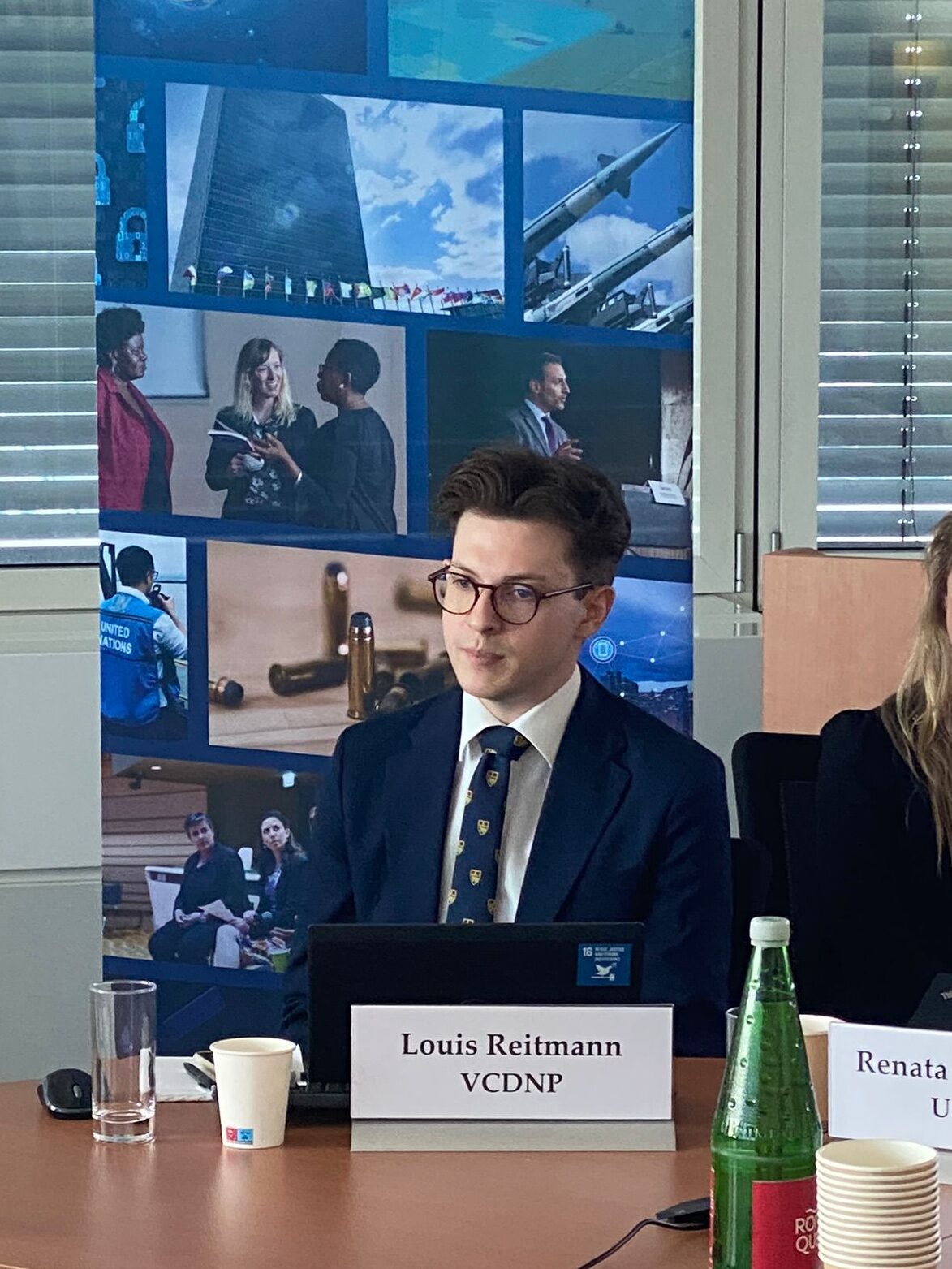
Research Associate Louis Reitmann submitted one of five proposals selected for a new research programme on intersectional and gendered perspectives on nuclear weapons by UNIDIR. On 2 August 2023, the VCDNP and UNIDIR hosted a workshop in which Mr. Reitmann and two other successful applicants presented their research plans to representatives from NPT States Parties, international organisations, and the expert community. Workshop participants provided valuable feedback and explained how the findings of each project will benefit their respective efforts to create more equitable nuclear policies.
Mr. Reitmann will research the positive impacts of diversity on work processes and how they can be used in nuclear policymaking. He plans to study existing findings about the way that diversity changes how people think, interact, and collaborate from the fields of psychology and behavioural science and make them accessible to the nuclear field. Studies find, for example, that diverse teams make fewer errors, are better problem-solvers, and foster innovation. Based on these insights, Mr. Reitmann’s final paper will make concrete recommendations to governments and organisations on activating the benefits of diversity in their work. Dr. Michal Onderco (Erasmus University) and Peixuan Xie (Peace Research Institute Frankfurt) presented their research projects, which will focus on gender and public opinion on nuclear weapons and feminist approaches to nuclear justice, respectively. All papers of this programme will be published as a UNIDIR edited volume in fall 2023.
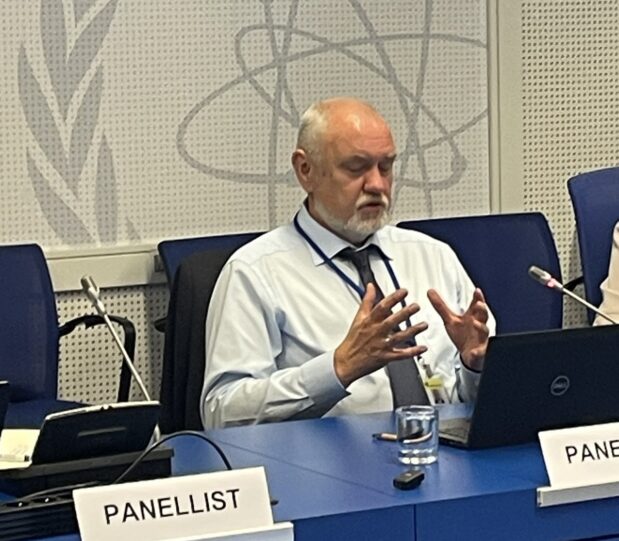
On 3 August 2023, Senior Fellow Dr. Nikolai Sokov spoke at a side event focused on no-first-use policies organised by Soka Gakkai International, the Nuclear Age Peace Foundation, and Parliamentarians for Nuclear Non-proliferation and Disarmament. In his remarks Dr. Sokov outlined the benefits of no-first-use policies as confidence-building measures that could contribute to nuclear disarmament by devaluing nuclear weapons as military and political tools. The main question, he argued, is how no-first-use policies could be achieved.
“No-first-use cannot, in and of itself, guarantee nuclear disarmament, but it can facilitate the achievement of that noble goal.”
Dr. Sokov referenced the inherent balance between conventional capabilities and no-first-use policies, observing that States that are conventionally stronger than their competitors have historically been more comfortable adopting no-first-use policies. He said that the probability of universality of no-first-use policies would increase in a future with a stable international situation and a return of arms control and confidence-building measures. He concluded that the United States and its allies are best positioned to adopt no-first-use policies, along with China and India, but that domestic politics remain prohibitive.
On 3 August 2023, Gaukhar Mukhatzhanova spoke at a side even on irreversibility of nuclear disarmament, organised by the Verification Research, Training and Information Centre (VERTIC) with support from the Government of Norway and the Government of the United Kingdom. Ms. Mukhatzhanova discussed the origins of concern regarding irreversibility of nuclear disarmament measures among NPT States Parties and why irreversibility was included in the 13 Practical Steps for nuclear disarmament adopted by the 2000 Review Conference.
Ms. Mukhatzhanova briefly reviewed subsequent efforts to conceptualise irreversibility of nuclear disarmament, highlighting in particular VERTIC’s 2011 work that views irreversibility in terms of cost and difficulty of rearmament and frames it as a scale rather than a singular state. She further underscored the importance of political, legal and normative factors in conceptualising irreversibility since, given the dual-use nature of nuclear material and technology, achieving irreversibility in purely technical terms would be impossible. Ms. Mukhatzhanova discussed the need to eventually achieve a shared understanding among NPT States Parties of what combination of technical, political, legal, and normative factors would provide sufficient confidence in the irreversibility of nuclear disarmament.
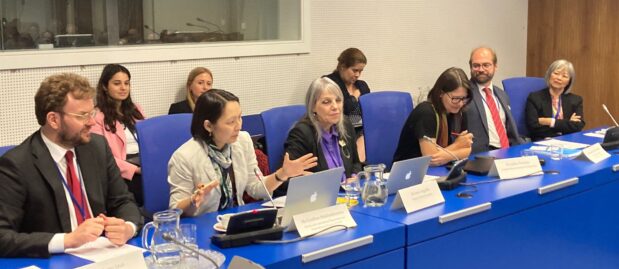
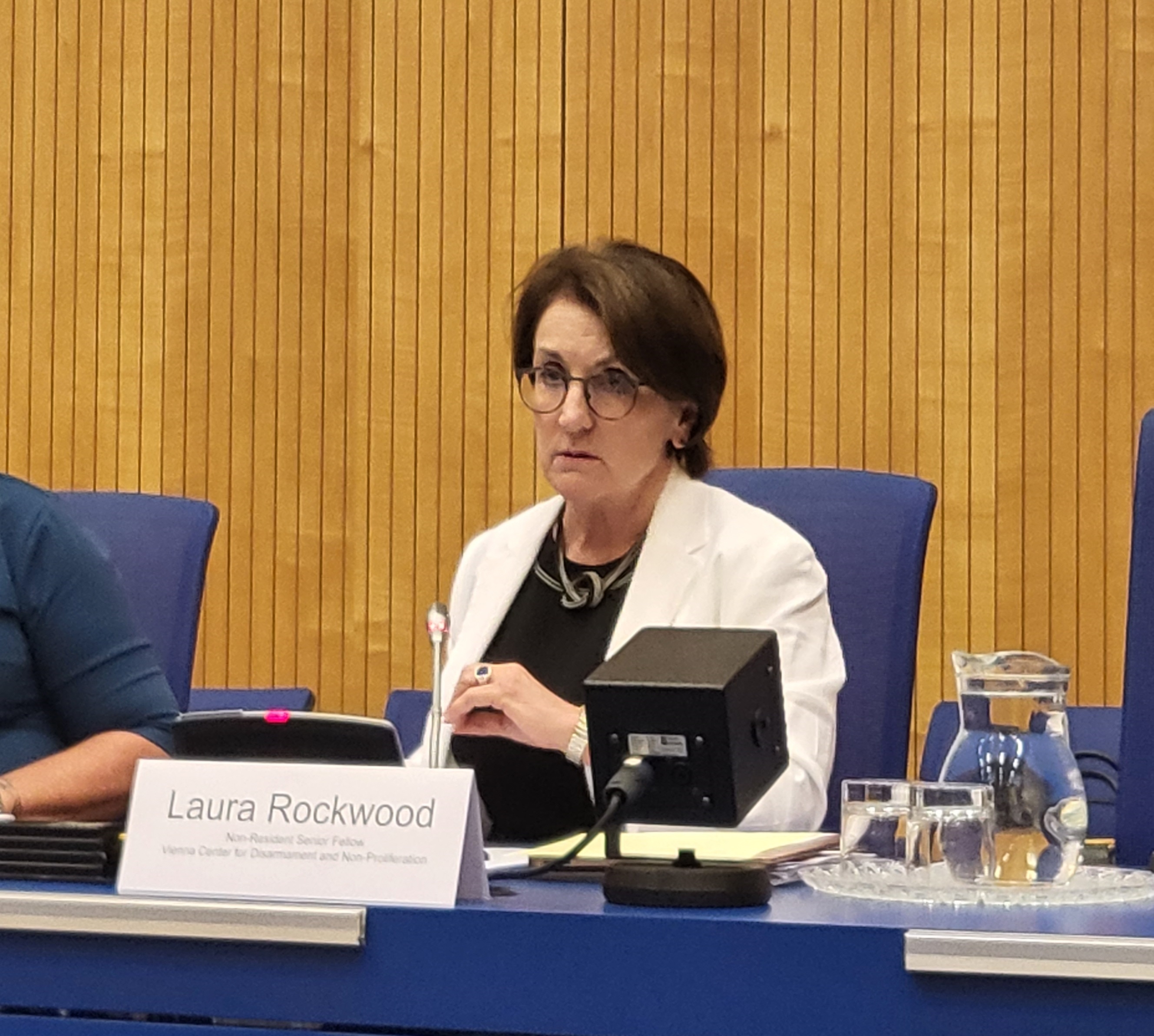
Senior Fellow Laura Rockwood spoke at a side event on 7 August 2023 that was hosted by the governments of Australia, the United Kingdom and the United States. Representatives from the three countries—collectively known as AUKUS—discussed their planned provision of nuclear-powered submarines to Australia. Ms. Rockwood’s remarks focused on five key legal aspects of naval nuclear propulsion and non-proliferation.
First, she reminded participants that naval nuclear propulsion is neither prohibited under the NPT nor the IAEA Statute. Second, she reflected on the negotiating history of INFCIRC/153, the document upon which all comprehensive safeguards agreements are based. A non-nuclear-weapon State may not use nuclear material that is otherwise subject to safeguards in a non-proscribed (non-prohibited) activity without making an arrangement with the IAEA. She said that the drafters of INFCIRC/153 included the requirement for NNWS to conclude an arrangement with the IAEA to ensure that exclusion of nuclear material in non-proscribed uses would not serve as a “loophole” allowing for the diversion of such material to a weapons programme.
Third, she observed that many negotiation mechanisms have been employed by the IAEA in the past, among which are committees of the Board of Governors and bilateral negotiations between the IAEA Secretariat and individual States. She noted that committees have been successful in some cases and less so in others. Regardless of how the arrangement will be negotiated, it will be submitted to the Board for “appropriate action.”
“Experience suggests that, when dealing with novel and complex technical issues, particularly in a politically volatile environment, there is merit to leaving their resolution to the technical experts.”
Fourth, Ms. Rockwood discussed the nature of the arrangement itself. She noted that the arrangement is meant to build in “guardrails” to make sure that any nuclear material and activities outside of safeguards are not misused for prohibited purposes. As such, verification measures may still be applied to material under such an arrangement and the arrangement can only apply while the nuclear material in question is in the non-proscribed activity.
Fifth, she considered the question of safeguards conclusions drawn for States with nuclear material in non-proscribed activities. Could the IAEA draw the so-called “broader conclusion” that all nuclear material remains in peaceful nuclear activities for such States? Ms. Rockwood made the point that the wording for safeguards conclusions has evolved over the years and could further evolve to fit this case.
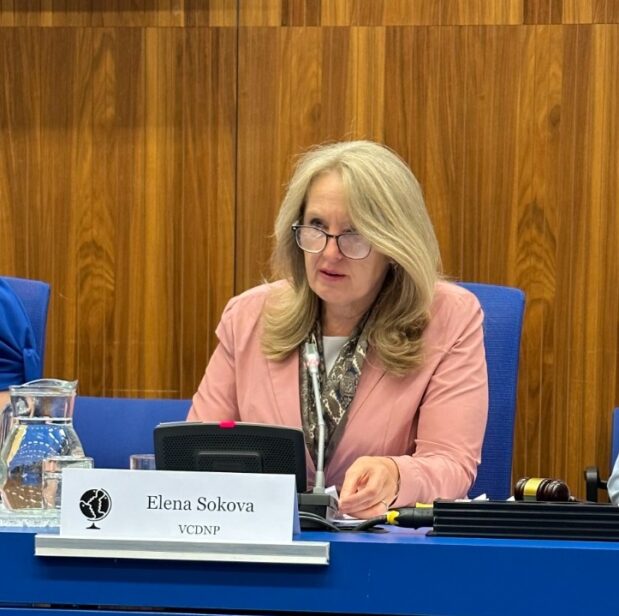
On 8 August 2023, Chatham House and the Department of Foreign Affairs of Ireland hosted a side event on “Navigating Nuclear Risk in Conflict: Avenues to Manage and Reduce Risks”. Executive Director Elena K. Sokova spoke at the side event, drawing attention to risks stemming from Russia’s war with Ukraine and Russia-West relations more broadly. In particular, she discussed the situation around the Zaporizhzhia nuclear power plant, noting that any response to a radiological incident at the plant would be extremely difficult due to the ongoing war. She characterised the risk related to the plant as one particularly prone to being the subject of information warfare due to potential false flag operations or NATO’s potential reaction to an accident, be it intentional or unintentional.
Ms. Sokova further noted the degradation of mutual understandings of the “nuclear taboo”—i.e. the taboo against the use of nuclear weapons. In this regard, she referenced the profound risks associated with direct military confrontation between Russia and NATO. Should a strike be carried out on military equipment or forces in a NATO country bordering Ukraine or on a NATO vessel in the Black Sea, for example, the risk of escalation could rise considerably. Ms. Sokova said this risk is made more prominent by the increase in domestic debate within Russia on the potential use of nuclear weapons.
Bearing in mind the above risks, Ms. Sokova pointed to the IAEA’s Seven Indispensable Pillars for Nuclear Safety and Security during an armed conflict and the related five principles to ensure nuclear safety and security at the Zaporizhzhia nuclear power plant in Ukraine. She also highlighted the Geneva Convention and its two Additional Protocols, which prohibit attacks on “nuclear power generating stations” and the treaty between India and Pakistan that also prohibits attacks on nuclear facilities. Finally, she recommended that communication channels between Russia and the West be kept open and actively used, unlike at the beginning of the war. This step, she said, would be particularly important given misinformation and the overall fog of war.
Featured image courtesy of Dean Calma / IAEA.



